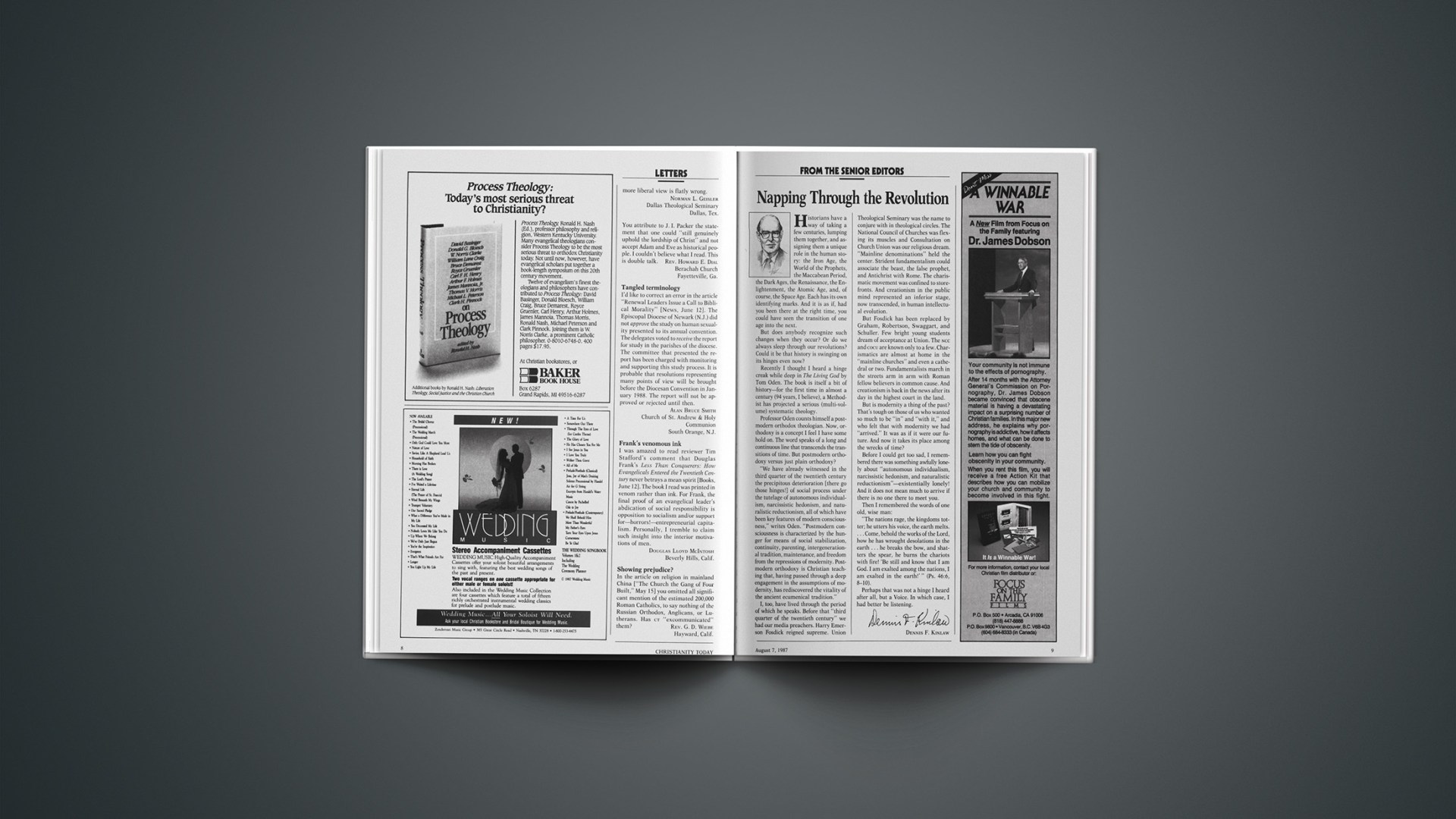Historians have a way of taking a few centuries, lumping them together, and assigning them a unique role in the human story: the Iron Age, the World of the Prophets, the Maccabean Period, the Dark Ages, the Renaissance, the Enlightenment, the Atomic Age, and, of course, the Space Age. Each has its own identifying marks. And it is as if, had you been there at the right time, you could have seen the transition of one age into the next.
But does anybody recognize such changes when they occur? Or do we always sleep through our revolutions? Could it be that history is swinging on its hinges even now?
Recently I thought I heard a hinge creak while deep in The Living God by Tom Oden. The book is itself a bit of history—for the first time in almost a century (94 years, I believe), a Methodist has projected a serious (multi-volume) systematic theology.
Professor Oden counts himself a postmodern orthodox theologian. Now, orthodoxy is a concept I feel I have some hold on. The word speaks of a long and continuous line that transcends the transitions of time. But postmodern orthodoxy versus just plain orthodoxy?
“We have already witnessed in the third quarter of the twentieth century the precipitous deterioration [there go those hinges!] of social process under the tutelage of autonomous individualism, narcissistic hedonism, and naturalistic reductionism, all of which have been key features of modern consciousness,” writes Oden. “Postmodern consciousness is characterized by the hunger for means of social stabilization, continuity, parenting, intergenerational tradition, maintenance, and freedom from the repressions of modernity. Postmodern orthodoxy is Christian teaching that, having passed through a deep engagement in the assumptions of modernity, has rediscovered the vitality of the ancient ecumenical tradition.”
I, too, have lived through the period of which he speaks. Before that “third quarter of the twentieth century” we had our media preachers. Harry Emerson Fosdick reigned supreme. Union Theological Seminary was the name to conjure with in theological circles. The National Council of Churches was flexing its muscles and Consultation on Church Union was our religious dream. “Mainline denominations” held the center. Strident fundamentalism could associate the beast, the false prophet, and Antichrist with Rome. The charismatic movement was confined to storefronts. And creationism in the public mind represented an inferior stage, now transcended, in human intellectual evolution.
But Fosdick has been replaced by Graham, Robertson, Swaggart, and Schuller. Few bright young students dream of acceptance at Union. The NCC and COCU are known only to a few. Charismatics are almost at home in the “mainline churches” and even a cathedral or two. Fundamentalists march in the streets arm in arm with Roman fellow believers in common cause. And creationism is back in the news after its day in the highest court in the land.
But is modernity a thing of the past? That’s tough on those of us who wanted so much to be “in” and “with it,” and who felt that with modernity we had “arrived.” It was as if it were our future. And now it takes its place among the wrecks of time?
Before I could get too sad, I remembered there was something awfully lonely about “autonomous individualism, narcissistic hedonism, and naturalistic reductionism”—existentially lonely! And it does not mean much to arrive if there is no one there to meet you.
Then I remembered the words of one old, wise man:
“The nations rage, the kingdoms totter; he utters his voice, the earth melts.… Come, behold the works of the Lord, how he has wrought desolations in the earth … he breaks the bow, and shatters the spear, he burns the chariots with fire! ‘Be still and know that I am God. I am exalted among the nations, I am exalted in the earth!’ ” (Ps. 46:6, 8–10).
Perhaps that was not a hinge I heard after all, but a Voice. In which case, I had better be listening.










